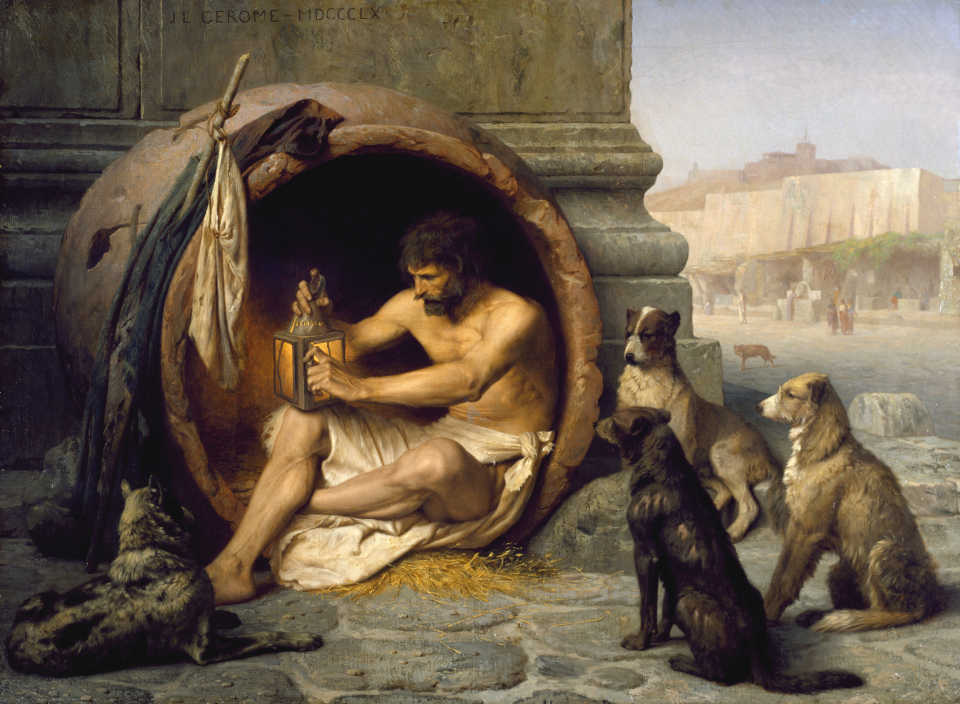Plato's interests were diverse, but perhaps the one he is best remembered for is his longstanding political utopianism: his longest and most-read dialogues concern the state and how carefully-crafted laws might improve its citizenry. Plato's great rival, Diogenes the Cynic, instead taught the opposite: that one should withdraw from not only politics but all cultural norms, adhering to no laws but Nature's.
Plato never involved himself in Athens' politics—perhaps unsurprisingly, Plato's wish for a "philosopher king" didn't fly in a democracy—but later in life he became involved in the politics of Syracuse. Syracuse was one of the jewels of the Hellenic world, rivaling Athens in size, wealth, and beauty—but, notably, was ruled by a tyrant, Dionysius I.
Dionysius had heard of the great fame of Plato and invited him to Sicily: Plato, noble-born and always happy to feast with kings, agreed. It seems the two did not hit it off, however: Plato kinda sorta insinuated that, without virtue, Dionysius would never become a true king; and, of course, the king kinda sorta answered that, without a head, Plato would never become an old dotard. As it happened, though, the king's brother-in-law, Dion, had taken a liking to Plato and managed to stay the execution. Plato was instead sold into slavery, but a friend happened to be at the auction and bought Plato for a small fortune and sent him back to Athens.
Not long after this, Diogenes, sniffing about, came upon a pensive-looking Plato in an upscale restaurant. "Oh, Plato," he barked, "you don't seem to be enjoying yourself. After dining in Sicily, are Athenian olives not good enough for you?" (By "Athenian olives," Diogenes was apparently referring to Athens' home-grown democracy.) Plato didn't catch Diogenes' meaning, so he motioned to the plate and said, "You're welcome to have some." To drive his point home, Diogenes stuffed the whole plateful in his mouth. Plato exclaimed, "I said some, Diogenes, not all!" but the rascally dog merely winked and wandered off.
This wasn't the end of Plato's political involvement in Syracuse, however. Dionysius died and his son, Dionysius II, took the throne, but he was as much a tyrant as his father, and moreover dissolute and incompetant. Dion remained an advisor, and, as I said, had taken a liking to Plato; he invited him back to Syracuse in order to teach his nephew and hopefully moderate his behavior. Plato did so, but his proposals to rewrite the city's laws made Dionysius suspicious of his uncle's motives: he imprisoned Plato and sent Dion into exile. In retaliation, Dion formed an army and conquered Sicily. He freed Plato and sent him home, but proved to be no better of a ruler than Dionysius was—in fact, he was soon assassinated and the throne was usurped by Callippus, another of Plato's disciples.
Back in Athens, Diogenes had scavenged some wild vegetables to make a coarse supper of, and was washing them in a public fountain, when Plato came by and said to him, "You know, Diogenes, if you made friends of the rich, instead of enemies, you wouldn't need to wash vegetables." Diogenes answered him, "Yes, Plato, but if you had been washing vegetables, you wouldn't have languished in prison."
Eventually, Dionysius regained his throne. Plato sailed a third time to Syracuse, hoping to make some amends and moderate the tyrant's renewed cruelty, but he returned home disappointed. And for all his hopes and idealism, what had he accomplished? Twenty years of chaos for the poor men and women of Sicily.
In the weeks that followed, as Plato pondered all of this, a letter arrived for him from Corinth. Plato glanced at the address, which read, "Diogenes to Plato the Sage." Plato sighed; thought, "I didn't know dogs could write;" and opened the letter.
It read, simply, "I told you so."
